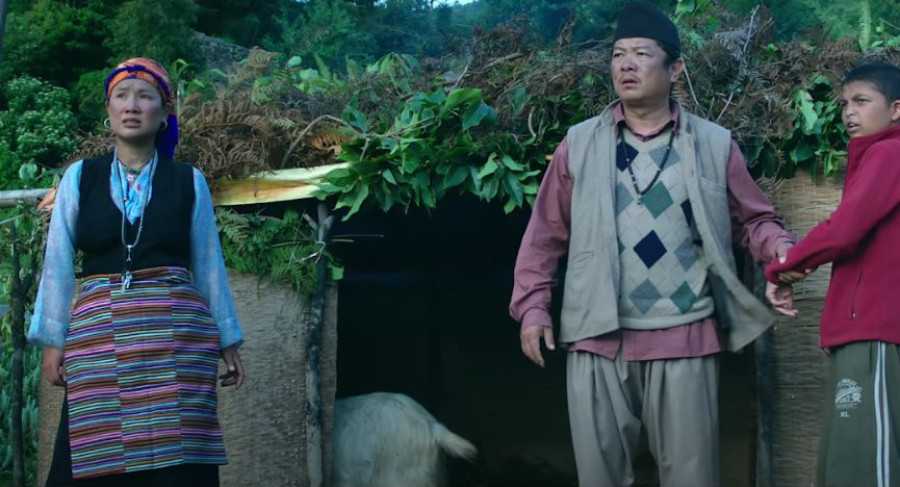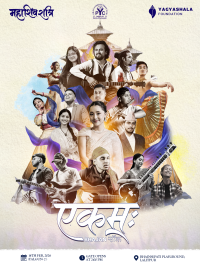Culture & Lifestyle
In ‘Karsang’, Dayahang Rai sticks to his repetitive role
The movie explores a Sherpa family’s struggle to balance tradition, and community expectations in the face of cultural conflict.
Timila Maharjan
‘Karsang’ is a social drama written and directed by Yam Sherpa that delves into the lives and cultural dilemmas of the Sherpa family in the rural village of Yarsa, Sindhupalchowk. At its heart, the film revolves around Karsang Ko Bihey, a traditional ritual involving the marriage and subsequent sacrifice of a male goat. This ceremony is symbolic, believed to ensure the village’s protection and preserve its cultural identity. However, the film goes beyond this ritual to explore themes of familial bonds, cultural expectations, and societal pressures, presenting a poignant yet weak narrative.
The story centres on a modest family of three: Lopsang (Dayahang Rai), a Jhakri (traditional healer) who struggles to balance his role as a Jhakri with his personal challenges; Dichhen (Srijana Ningkelu), his hardworking wife who oversees the household and works in the fields; and their mischievous son, Torme, whose playful rebellion and attachment to Karsang—the family goat—become central to the plot.
The family’s daily struggles are intensified by societal expectations. Lopsang faces increasing pressure from his relatives and the villagers to conduct the long-overdue ritual, Karsang Ko Bihey. According to tradition, the ritual’s completion is necessary not only for the village's protection but also for maintaining familial obligations, including celebrations like puja, bhakal (a vow to offer something to gods or goddesses if the wishes are fulfilled), and chewar, (a head-shaving ceremony for sons). The village chairperson played by Budhhi Tamang, underscores the ritual's significance, stating that its delay has hindered the community’s ability to organise such ceremonies.
However, this cultural obligation clashes with Torme’s emotional bond with Karsang, who he views as a family member. The film effectively portrays the son’s innocent yet fierce determination to protect his beloved companion, contrasting with the adults’ adherence to tradition.
Lopsang’s inner conflict is a central theme, as he is torn between upholding the community's expectations and preserving his son’s happiness. Adding complexity to the narrative is Lopsang’s friendship with Maila (Jitu Nepal), a loyal character who provides immense support despite his own marital struggles.
The subplot involving Maila’s wife (Deeya Maskey) introduces the sensitive issue of infertility, shedding light on the societal stigma women face. Unfortunately, this subplot is underdeveloped, and the film fails to explore the emotional depth and implications of such an issue, reducing it to a tokenistic element.
The emotional climax is the film’s strongest point. When Torme’s love for Karsang drives him to hide the goat to prevent its sacrifice, his desperation forces Lopsang to confront his own beliefs. In a touching moment, Lopsang recalls fond memories of the goat and his son, ultimately choosing his family’s happiness over cultural obligations.
The ritual is abandoned, and the family, now boycotted by the community, decides to leave the village with Karsang. Their departure signifies both loss and liberation as they prioritise their personal principles over societal approval. The betrayal from relatives in times of need reveals a bitter reality, where a person without power or wealth is often abandoned, even by those bound by blood.
While the film raises important questions about the conflict between tradition and individual values, it stumbles in execution. The narrative often feels overly fixated on the ritual, stretching the story unnecessarily and limiting its exploration of broader themes. The subplot on fertility stigma, while relevant, is poorly integrated and lacks resolution, undermining its potential impact.
The emotional moments in the film are further hampered by the overuse of dramatic background music, which often feels unnatural rather than organic. Rai’s performance, though competent, lacks novelty. Despite playing a Sherpa character for the first time, his role feels like a repetition of familiar tropes—yet another struggling father in a rural setting. A more nuanced or distinct portrayal could have brought freshness to the character.
On the other hand, the supporting cast delivers notable performances. Ningkelu captures Dichhen’s resilience and quiet strength, while Nepal’s portrayal of Maila is both authentic and relatable. The cinematography is another highlight, beautifully capturing the scenic landscapes and cultural essence of Yarsa village, immersing viewers in the Sherpa community's world.
The movie beautifully showcases the rich culture and traditions of the Sherpa community. For viewers like me, who may not be familiar with Sherpa culture, it provides a fascinating glimpse into their unique practices and way of life. I particularly appreciated the inclusion of dialogues in the Sherpa language, accompanied by Nepali subtitles. This thoughtful detail not only added authenticity to the film but also offered an immersive cultural experience, enhancing its overall appeal.
Overall, ‘Karsang’ succeeds in sparking a dialogue about the tension between cultural practices and personal choices, but it struggles to deliver a cohesive and impactful narrative. While the film’s setting and acting provide moments of brilliance, its predictable plot, overemphasis on a single ritual, and missed opportunities for meaningful storytelling leave it short of its potential. For viewers seeking a thought-provoking exploration of cultural conflicts and family dynamics, ‘Karsang’ offers glimpses of depth but may ultimately feel underwhelming.
Karsang
Director: Yam Sherpa
Starring: Dayahang Rai, Deeya Maskey, Jitu Nepal, Buddhi Tamang, Srijana Ningkelu
Duration: 125 minutes
Language: Nepali
Available: In nearby cinemas
Year: 2025




 20.12°C Kathmandu
20.12°C Kathmandu















